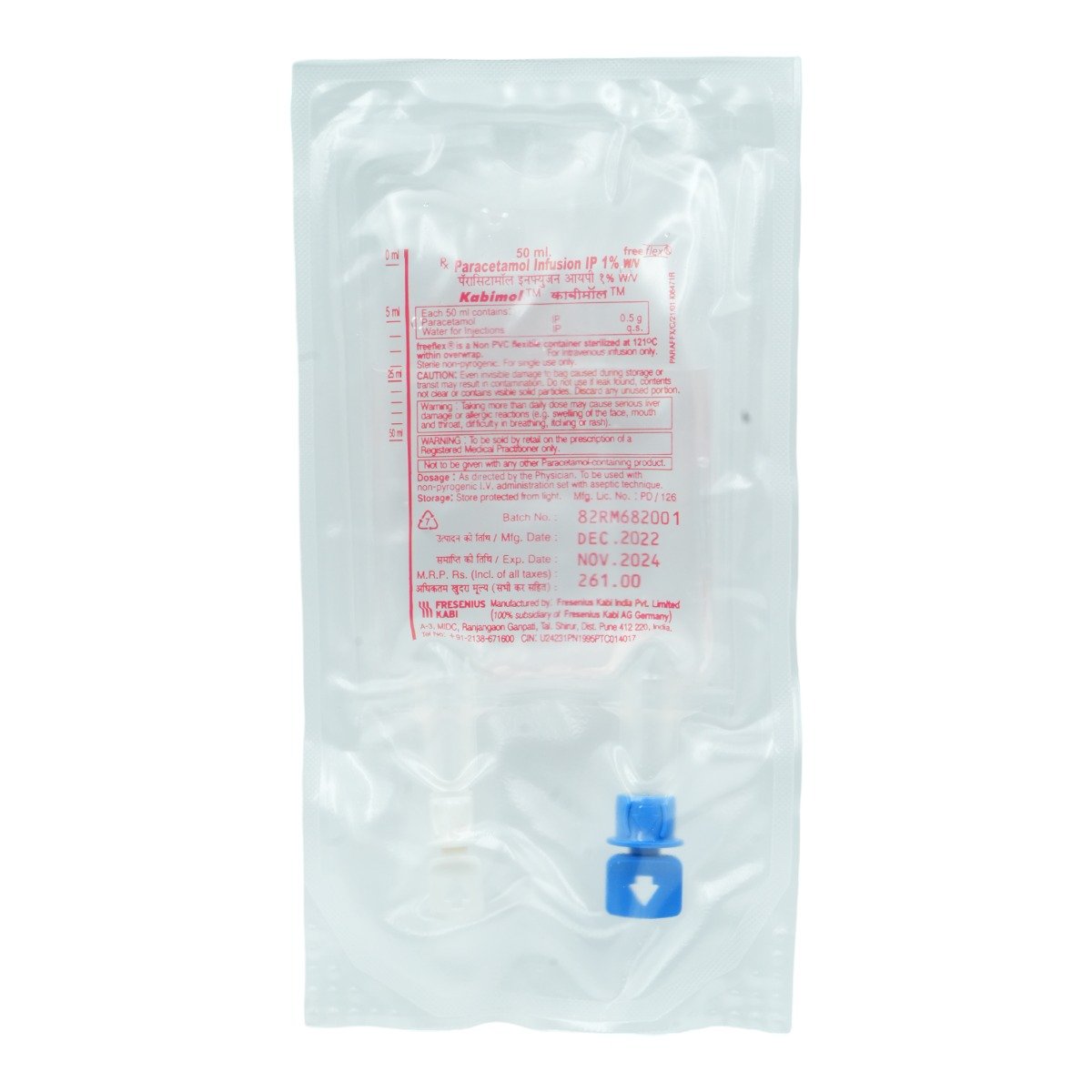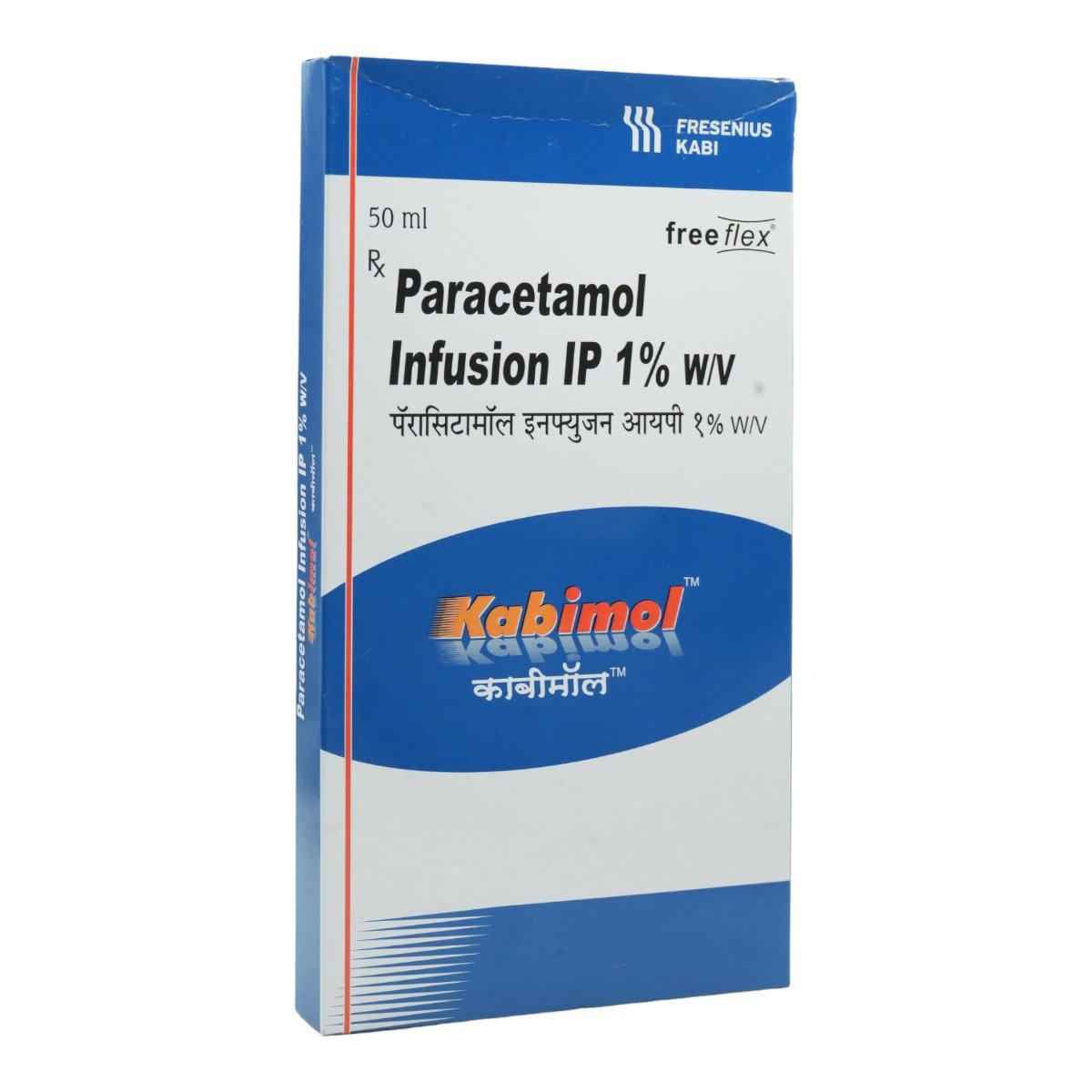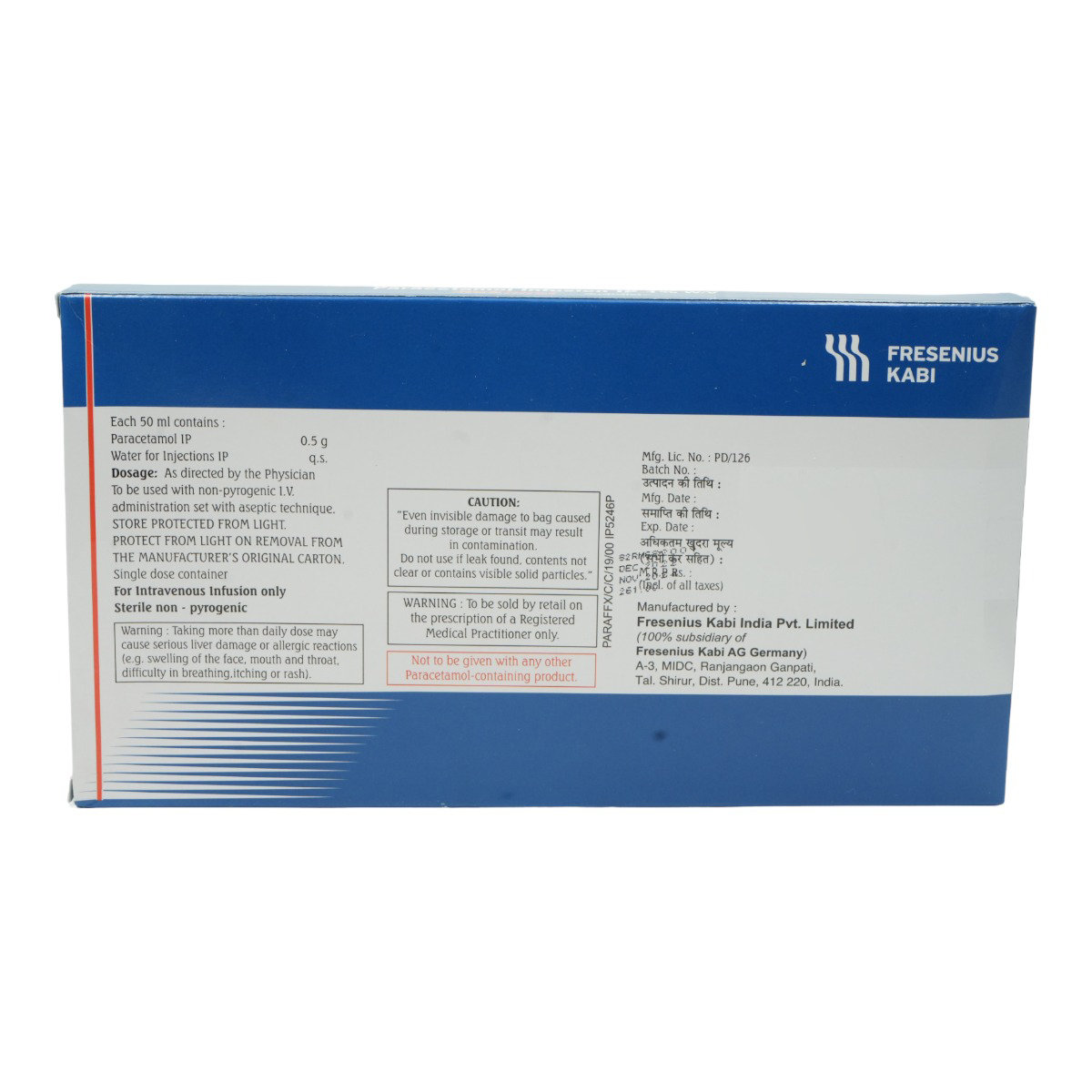Kabimol Infusion 50 ml
MRP ₹295
(Inclusive of all Taxes)
₹44.3 Cashback (15%)
Selected Pack Size:50 ml
50 ml ₹265.5
(₹5.31 per ml)
In Stock
Provide Delivery Location
Online payment accepted
 Prescription drug
Prescription drugWhats That
Composition :
Manufacturer/Marketer :
Consume Type :
Expires on or after :
Return Policy :
NPPA :
About Kabimol Infusion
Kabimol Infusion belongs to the group of medicines called analgesic and antipyretic agents, primarily used to relieve mild to moderate pain and to treat fever. Pain is a symptom triggered by the nervous system, which causes uncomfortable sensations in the body. Fever occurs when the body's temperature goes above the average body temperature (98.6°F or 37°C).
Kabimol Infusion contains 'Paracetamol,' which prevents the formation of chemical messengers called prostaglandins, which cause pain and swelling at the injury sites. This process reduces the mild to moderate pain and inflammation at the injured or damaged site. Kabimol Infusion also affects an area of the brain that regulates body temperature known as the hypothalamic heat-regulating centre. Thus, it reduces fever.
Your doctor will decide the dose and duration of Kabimol Infusion based on the severity of your medical condition. Common side effects of Kabimol Infusion include constipation, nausea, and vomiting. These side effects are not familiar to everyone and vary individually. If you notice any side effects that are not manageable, please consult your doctor.
Please tell your doctor if you are allergic to any of the components of Kabimol Infusion. Let your doctor know if you use any other pain killers before starting this medicine. Inform your doctor if you have liver or kidney diseases, malnutrition, dehydration, and a history of alcoholism before starting Kabimol Infusion. It is essential to let your doctor know if you are pregnant, planning to conceive or are a breastfeeding mother. It is not recommended to consume alcohol while using Kabimol Infusion.
Uses of Kabimol Infusion
Directions for Use
Key Benefits
Kabimol Infusion contains 'Paracetamol,' which is an analgesic (relieves pain) and an antipyretic (reduces fever). It prevents the formation of chemical messengers called prostaglandins, which cause pain and swelling at the injury sites. This process reduces the mild to moderate pain and inflammation at the injured or damaged site. Kabimol Infusion also affects an area of the brain that regulates body temperature known as the hypothalamic heat-regulating centre. Thus, it reduces fever.
Storage
- Tell your doctor about any pain or discomfort at the infusion site.
- Apply a warm compress to reduce swelling and ease pain.
- Switch infusion sites to avoid irritating the same spot.
- Practice calming techniques like deep breathing, meditation, or yoga to manage pain and anxiety.
Drug Warnings
Let your doctor know if you use any prescription and non-prescription medications, including other vitamins, before starting Kabimol Infusion. Notify your doctor if you have any intolerance or allergy to any of the components in Kabimol Infusion. Inform your doctor if you have liver or kidney diseases, malnutrition, dehydration, and a history of alcoholism before starting Kabimol Infusion. Please consult your doctor know if you are pregnant, planning to conceive or are a breastfeeding mother. Do not consume alcohol while being treated with Kabimol Infusion.
Drug-Drug Interactions
Drug-Drug Interactions
Login/Sign Up
Co-administration of Kabimol Infusion 50 ml may decrease the excretion rate of Oxazepam which could result in a higher serum level.
How to manage the interaction:
Although there is a possible interaction between Oxazepam and Kabimol Infusion 50 ml, you can take these medicines together if prescribed by a doctor. Do not stop using any medications without a doctor's advice.
Co-administration of ketamine and Kabimol Infusion 50 ml may decrease the effectiveness of Ketamine which could result in a higher blood level.
How to manage the interaction:
Although taking Ketamine and Kabimol Infusion 50 ml together can evidently cause an interaction, it can be taken if a doctor has suggested it. If you're feeling very sleepy or having trouble breathing, it's important to contact your doctor right away. Do not stop using any medications without a doctor's advice.
Co-administration of Teriflunomide with Kabimol Infusion 50 ml may increase the risk or severity of Liver problems.
How to manage the interaction:
Taking Kabimol Infusion 50 ml with Teriflunomide together can possibly result in an interaction, but it can be taken if a doctor has advised it. Do not discontinue any medications without consulting a doctor.
Co-administration of Kabimol Infusion 50 ml and Ketoconazole may increase the risk of liver injury.
How to manage the interaction:
Although there is a possible interaction between Kabimol Infusion 50 ml and Ketoconazole, you can take these medicines together if prescribed by a doctor. However, if you have joint pain or swelling, fever, chills, unusual bleeding or bruising, skin rash, itching, over-tiredness, nausea, vomiting, loss of appetite, stomach pain, dark-colored urine, light-colored stools, and/or yellowing of the skin or eyes, contact a doctor immediately as these may be signs and symptoms of liver damage. Do not discontinue the medication without consulting a doctor.
Co-administration of Kabimol Infusion 50 ml and Leflunomide may increase the risk of liver problems.
How to manage the interaction:
Although there is a possible interaction between Kabimol Infusion 50 ml and Leflunomide, they can be taken together if prescribed by a doctor. However, if you experience fever, chills, joint pain or swelling, unusual bleeding or bruising, skin rash, itching, less desire to eat, fatigue, nausea, vomiting, abdominal pain, or yellowing of the skin or eyes, contact a doctor immediately. Do not discontinue any medications without consulting a doctor.
Co-administration of Kabimol Infusion 50 ml and Valdecoxib may increase the risk or severity of adverse effects.
How to manage the interaction:
Although there is a possible interaction between Kabimol Infusion 50 ml and Valdecoxib, you can take these medicines together if prescribed by a doctor. However, if the side effects worsen, please consult a doctor.
Co-administration of Lomitapide and Kabimol Infusion 50 ml may increase the risk of severity of liver injury.
How to manage the interaction:
Although there is a possible interaction between Kabimol Infusion 50 ml and Lomitapide, you can take these medicines together if prescribed by a doctor. Do not stop using any medications without a doctor's advice.
Co-administration of Mipomersen with Kabimol Infusion 50 ml may increase the risk or severity of liver injury.
How to manage the interaction:
There may be a possibility of interaction between Kabimol Infusion 50 ml and Mipomersen, but it can be taken if prescribed by a doctor. Do not stop using any medications without talking to a doctor.
Drug-Food Interactions
Drug-Food Interactions
Login/Sign Up
Diet & Lifestyle Advise
- Performing yoga may help in improving overall flexibility and pain management.
- Maintain a healthy weight by performing regular low-strain exercises and eating healthy food.
- Get adequate sleep as resting the muscles can help in reducing inflammation and swelling.
- Follow heat or cold therapy; apply a cold or hot compress on the joints for 15-20minutes regularly.
- Acupuncture, massage, and physical therapy may also be helpful.
- Eat food rich in antioxidants such as berries, spinach, kidney beans, dark chocolate, etc.
- Foods containing flavonoids help in reducing inflammation. These include soy, berries, broccoli, grapes, and green tea.
- Avoid smoking and alcohol consumption.
Side Effects of Kabimol Infusion
- Constipation
- Nausea
- Vomiting
Habit Forming
Therapeutic Class
All Substitutes & Brand Comparisons
Author Details
We provide you with authentic, trustworthy and relevant information
Drug-Diseases Interactions
Drug-Diseases Interactions
Login/Sign Up
Chronic alcoholics may have a higher risk of hepatotoxicity when using Kabimol Infusion 50 ml. Patients using Kabimol Infusion 50 ml may cause severe liver damage, including acute liver failure that required a liver transplant and resulted in death.
How to manage the interaction:
Kabimol Infusion 50 ml should be used with caution in patients who consume three or more alcoholic drinks a day. Avoid alcohol consumption while taking Kabimol Infusion 50 ml. If you have nausea, vomiting, fever, rash, anorexia (eating disorder), over-tiredness, upper right stomach pain, dark urine, and jaundice, contact your doctor as these may be signs and symptoms of liver injury.
The liver predominantly converts Kabimol Infusion 50 ml to inactive forms. Patients with hepatic impairment may be more prone to toxicity because their minor metabolic pathways are more active.
How to manage the interaction:
Kabimol Infusion 50 ml should be used with caution in patients with kidney insufficiency. Also, it is recommended to avoid drinking alcohol while taking Kabimol Infusion 50 ml.
FAQs
Drug-Drug Interactions Checker List
- PROBENECID
- WARFARIN
- ACENOCOUMAROL
- SALICYLAMIDE
Disease/Condition Glossary
Pain: It is not a disease but a symptom triggered by the nervous system, causing uncomfortable sensations in the body. Pain may be dull or sharp; it might be constant or may come and go. The tolerance level of pain might vary from person to person. Pain can be generalized (overall body aches) or localized (affecting a specific area of the body).
Fever: When the body's temperature goes above the average temperature of 98.6°F (37°C), it is called fever or pyrexia. It is considered as a response of the body's immune system to external factors.

Have a query?
Alcohol
Safe if prescribed
You are recommended to avoid alcohol consumption while taking Kabimol Infusion. Alcohol intake, along with Kabimol Infusion may cause increased liver damage.
Pregnancy
Consult your doctor
Please consult your doctor before taking Kabimol Infusion if you are a pregnant.
Breast Feeding
Consult your doctor
Kabimol Infusion should be used during breastfeeding only when suggested by a doctor.
Driving
Safe if prescribed
Kabimol Infusion does not usually affect your ability to drive.
Liver
Consult your doctor
Please consult your doctor since Kabimol Infusion should be used with caution in patients with liver impairment/liver disease.
Kidney
Consult your doctor
Please consult your doctor since Kabimol Infusion should be used with caution in patients with kidney impairment/kidney disease.
Children
Safe if prescribed
Kabimol Infusion should be given to children only when prescribed by a doctor










_0.jpg?tr=q-85)
